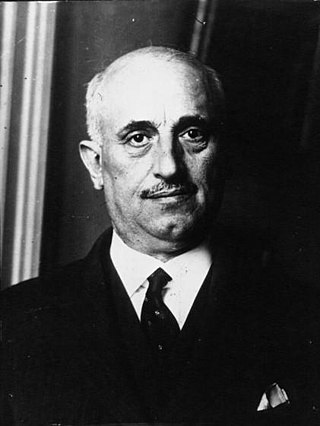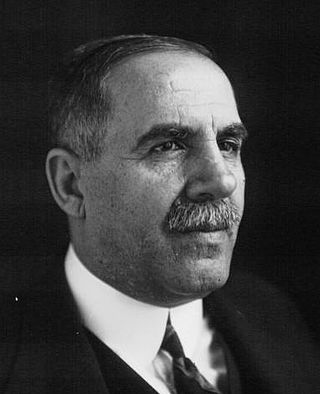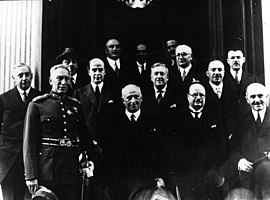
The prime minister of the Hellenic Republic, colloquially referred to as the prime minister of Greece, is the head of government of the Hellenic Republic and the leader of the Greek Cabinet.

Georgios Papandreou was a Greek politician, the founder of the Papandreou political dynasty. He served three terms as prime minister of Greece. He was also deputy prime minister from 1950 to 1952, in the governments of Nikolaos Plastiras and Sofoklis Venizelos. He served numerous times as a cabinet minister, starting in 1923, in a political career that spanned more than five decades.

Alexandros Zaimis was a Greek politician who served as Greece's Prime Minister, Minister of the Interior, Minister of Justice, and High Commissioner of Crete. He served as Prime Minister six times. Although he was a leader of the monarchist faction, Zaimis was the third and last President of the Second Hellenic Republic.
The Liberal Party was a major political party in Greece during the early-to-mid 20th century. It was founded in August 1910 by Eleftherios Venizelos and went on to dominate Greek politics for a considerable number of years until its decline following the Second World War. Among its most well-known members, apart from Venizelos, were Alexandros Papanastasiou, Nikolaos Plastiras, Georgios Papandreou and Konstantinos Mitsotakis.
Parliamentary elections were held in Greece on 19 August 1928. The result was a victory for the Liberal Party, which won 178 of the 250 seats.
The terms Apostasia or Iouliana or the Royal Coup are used to describe the political crisis in Greece centered on the resignation, on 15 July 1965, of Prime Minister Georgios Papandreou and subsequent appointment, by King Constantine II, of successive prime ministers from Papandreou's own party, the Centre Union, to replace him. Defectors from the Center Union were branded by Papandreou's sympathizers as Apostates ("renegades"). The Apostasia heralded a prolonged period of political instability, which weakened the fragile post-civil war order, and ultimately led to the establishment of the military regime in April 1967.

The history of the Hellenic Republic constitutes three republican periods in the modern history of Greece: from 1822 until 1832; from 1924 until 1935; and from 1974 through to the present. See also the constitutional history of Greece.

Alexandros Papanastasiou was a Greek lawyer, sociologist and politician who served twice as the Prime Minister of Greece in the interwar period, being a pioneer in the establishment of the Second Hellenic Republic.

Emmanouil Tsouderos was a political and financial figure of Greece. During World War II, he was the internationally recognized Prime Minister of Greece from 1941 to 1944 as head of the Greek government in exile. He resigned in 1944, following a mutiny in the exiled armed forces

The Second Hellenic Republic is a modern historiographical term used to refer to the Greek state during a period of republican governance between 1924 and 1935. To its contemporaries it was known officially as the Hellenic Republic or more commonly as Greece. It occupied virtually the coterminous territory of modern Greece and bordered Albania, Yugoslavia, Bulgaria, Turkey and the Italian Aegean Islands. The term Second Republic is used to differentiate it from the First and Third republics.

The First Cemetery of Athens is the official cemetery of the City of Athens and the first to be built. It opened in 1837 and soon became a prestigious cemetery for Greeks and foreigners. The cemetery is located behind the Temple of Olympian Zeus and the Panathinaiko Stadium in central Athens. It can be found at the top end of Anapafseos Street. It is a large green space with pines and cypresses.

The National Progressive Centre Union was a Greek Venizelist political party. It was founded in 1950 by Nikolaos Plastiras, and formed a government with other Centrist parties after the 1950 legislative election. It later formed another coalition government after the resignation of Sofoklis Venizelos as Prime Minister, and another one in 1951 with Venizelos. After Plastiras's death in 1953, the party continued to exist, but was subsumed into the Centre Union in 1961.

Georgios Kafantaris was a Greek politician, a political personality of the first half of the 20th century and a prominent member of the Venizelist party.
The Deputy Prime Minister of Greece is the second senior-most member of the Greek Cabinet. Despite the English translation of the title, he does not actually deputize for the Prime Minister, rather it is a mostly honorific post for senior ministers, and is usually combined with another senior government portfolio or a coordinating role over several ministries. The post is not permanent, rather it is created on an ad hoc basis, usually for the leaders of junior parties in coalition cabinets, and may be held by more than one person at once.

Alexandros Pilatos Sakellariou was a Greek admiral and politician, who led the Royal Hellenic Navy in World War II.
The Minister of State is a position within the Cabinet of Greece.

Alexandros Hatzikyriakos was a Greek Navy officer who rose to the rank of rear admiral. He played a major role in the establishment of the Second Hellenic Republic in 1924, and served thrice as Minister for Naval Affairs and two brief periods as Foreign Minister.

Fotini "Fofi" Gennimata was a Greek politician who served as president of the Panhellenic Socialist Movement (PASOK) from 2015 to 2021. During her tenure as party leader, she also co-founded and led the Democratic Alignment and the Movement for Change, two successive political alliances of centre-left parties formed around PASOK. She was the daughter of Georgios Gennimatas, a high-profile government minister during the PASOK administrations of the 1980s and 1990s.

The First Cabinet of Kyriakos Mitsotakis was sworn in on 9 July 2019, following the Greek legislative election in July 2019. Kyriakos Mitsotakis, leader of New Democracy, was sworn in as Prime Minister of Greece on 8 July.















